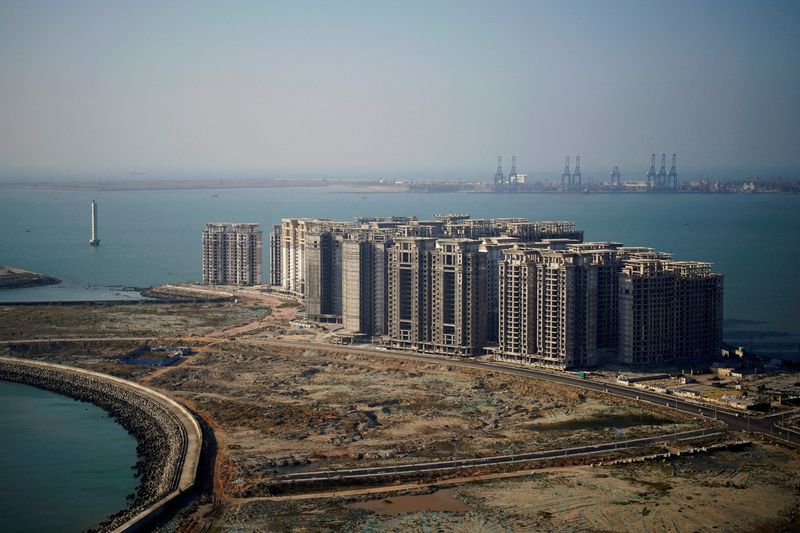By Scott Murdoch
SYDNEY (Reuters) – The chairman of China Evergrande Group has been placed under police surveillance, Bloomberg News reported on Wednesday, raising more doubts about the embattled developer’s future as it also grapples with mounting prospects of liquidation.
Evergrande is the world’s most indebted property developer and has been at the centre of an unprecedented liquidity crisis in China’s property sector, which accounts for roughly a quarter of the world’s second-largest economy.
Once China’s top-selling developer, Evergrande’s financial crisis became public in 2021 and since then it and a string of its peers have defaulted on their offshore debt obligations amid slowing home sales and fewer new avenues for fundraising.
WHAT’S NEXT FOR EVERGRANDE IF ITS DEBT RESTRUCTURING PLAN FAILS?
Evergrande has been in the process of seeking its creditors’ approval to restructure offshore debt worth $31.7 billion, which includes bonds, collateral, and repurchase obligations, amid weakening cash flows.
Under the plan, Evergrande proposed various options to offshore creditors in March this year, including swapping some of their debt holdings into new bonds with maturities of 10 to 12 years.
But a weekend announcement it could not issue new debt due to a regulatory investigation underway into one of its main Chinese units has thrown those plans into disarray.
A major group of Evergrande offshore bondholders plans to join a liquidation petition due to be heard in a Hong Kong on Oct. 30 unless Evergrande can present a new restructuring plan before then.
A government intervention to prop up Evergrande and external liquidity support in the near-term is unlikely.
Liquidation is a possibility but could be the worst case scenario for Evergrande as the company will no longer exist and its debt will be marked down to zero with ramifications for its lenders.
In such an event, the offshore bondholders will be able to maintain their claims against the company’s executives, officers and offshore assets, which gives them some access to recoup a small part of their lost investment.
WHAT ROLE DID CHAIRMAN HUI KA YAN PLAY AND WHAT HAPPENS TO HIM NOW?
Hui founded Evergrande in Guangzhou in 1996 and listed the company in Hong Kong in 2009. The company grew rapidly through a land-buying spree backed by loans and by selling apartments quickly at low margins.
But Evergrande’s liabilities ballooned to more than $300 billion and the company quickly came under pressure as China’s property market weakened after a government crackdown on the debt-fuelled building boom.
The structure of Evergrande and the way the business operated under Hui has come under scrutiny as the property empire began to unravel amid growing pressure to meet repayment obligations and finish apartment construction.
Bloomberg News reported citing sources that Hui was taken away by police earlier this month and is being monitored at a designated location.
The development comes after police in southern China said earlier this month that they have detained some staff at Evergrande’s wealth management unit, which raised funds from individual investors by selling investment products.
The police actions against Evergrande indicate that Hui may not remain at the helm of the company for very long, but it is unclear who he would be replaced with, or whether the government will play any role in running the company.
HOW DID EVERGRANDE COME INTO THE PUBLIC EYE?
Evergrande’s supercharged growth helped it become one of China’s biggest and most lucrative property developers with sales worth $110 billion in 2020. Its fall from grace has been just as remarkable.
The developer’s rapid borrowing spree during its hey day meant it was also the biggest dollar bond issuer in the sector.
The company’s entire offshore debt was deemed in default after it missed several bond payments in late 2021, and creditors have been grappling with a solution since then.
Evergrande’s decline started to infect the rest of the Chinese property sector as credit conditions deteriorated, and rival developers started to struggle with some forced into default.
WHAT ROLE HAVE CHINESE REGULATORS PLAYED SO FAR RELATED TO EVERGRANDE?
After having maintained silence on the Evergrande crisis in 2021, a central bank official in October that year blamed the company for not operating and managing itself well. The official said Evergrande “blindly diversified and expanded its business”.
As the crisis snowballed, a risk-management committee was established at the developer in December 2021 that included officials from state companies to assist in its debt and asset restructuring.
Soon after that, authorities scrambled to assure markets that risks to the property sector and economy could be controlled.
While any direct support by the state to Evergrande is not known, Beijing over the past year rolled out a raft of measures to support the property sector while making completion of unfinished homes a priority for the developers.
(Reporting by Scott Murdoch in Sydney; Editing by Sumeet Chatterjee and Muralikumar Anantharaman)

